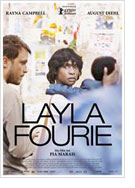

Opening 4 Jul 2013
Directed by:
Pia Marais
Writing credits:
Horst Markgraf, Pia Marais
Principal actors:
Rayna Campbell, August Diehl, Rapule Hendricks, Terry Norton, Rapulana Seiphemo
Layla Fourie (Rayna Campbell) is a young, black, South African, single mother who is beginning her career as a polygraph examiner. When she is offered a temporary job of testing potential employees for a casino far away from her home, she must take her young son Kane (Rapule Hendricks) with her because she has no one she can turn to for help. When an accident happens along the way, she does not fully appreciate the effect it has on both her and her son and the consequences it will reap.
Perhaps the most unfortunate aspect of Layla Fourie is that it had so much potential to be great, but, for the most part, failed. A young, black, South African, single mother attempting to better her and her son's lives before a freak accident destroys everything is such an excellent set-up. There are the hot-topic issues of racism, women's rights, single parent support systems and the effects of all of these aspects in regards to criminal justice in South Africa to drive the plot. Add to that a female director and co-writer (Pia Marais), and there was a great opportunity for insight. However, instead of making a fresh film with a new perspective, Layla Fourie falls into the normal trappings of films with unfulfilled potential, which is what makes it so frustrating.
Layla is originally portrayed as a strong woman. We meet her in the first scene during her interview to be a polygraph examiner, where she espouses the importance of truth and how lies beget more lies, foreshadowing the consequences of her actions later in the film. She is a moral woman who faces tough choices due to being a single mother. Her son's father doesn't want anything to do with him, and she has a hard time keeping him sheltered from the crime and gangs that make up every day life in Johannesburg. She hopes her new job will provide the income to provide Kane with a better life. However, once the accident occurs, and she lies to protect herself and her son, the characterization of Layla begins to devolve.
After the accident, the film becomes a rather conventional thriller and Layla loses her humanity as a character. The rest of the film borders on absurdity, as through a number of coincidences Layla is put into the path of the very people she is trying to avoid. Instead of avoiding these individuals, she instead continues to hang around them as though she is torturing herself. However, aside from her guilt, the rest of her emotions are not clear to the audience for, as a person who has been trained to spot liars, Layla is able to mask her emotions well. However, this makes it so that she becomes something of a brick wall, and the audience is no longer able to follow her motivations. This culminates in a rather ridiculous scene where she puts her son in the bathroom of her small hotel room and then has sex with the (rather abusive) man who has been pursuing her. Her real motivation for this action is lost on me, because, personally, if I were in a situation where the police were searching for me and the man who could destroy my life were in my hotel room, the last thought on my mind would be to have sex with him.
Ignoring the clichéd thriller plot, the most unsatisfying aspect of Layla Fourie is that Pia Marais failed to portray a real woman and instead wrote Layla as a two-dimensional victim. Layla's characterization is thus: she was a strong woman trying to make a better life for her son, an unfortunate accident occurs and she chooses to lie about it rather than bring her case to the corrupt government; she becomes like all of the other criminals she has always tried to distance herself from, her guilt eats her up inside and her life is forever ruined. Layla does not grow as a character, find hidden strength or learn any lessons. She is a victim of bad luck who continues to be a victim for the rest of the film. Considering this was one of the two competition films directed by a woman, it is rather sad that Layla is such a two-dimensional representation of a woman. (Rose Finlay)